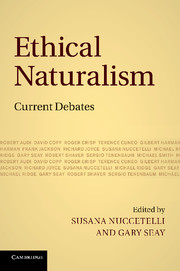Book contents
- Frontmatter
- Contents
- Contributors
- Introduction
- Chapter 1 Naturalism in moral philosophy
- Chapter 2 Normativity and reasons: five arguments from Parfit against normative naturalism
- Chapter 3 Naturalism: feel the width
- Chapter 4 On ethical naturalism and the philosophy of language
- Chapter 5 Metaethical pluralism: how both moral naturalism and moral skepticism may be permissible positions
- Chapter 6 Moral naturalism and categorical reasons
- Chapter 7 Does analytical moral naturalism rest on a mistake?
- Chapter 8 Supervenience and the nature of normativity
- Chapter 9 Can normativity be naturalized?
- Chapter 10 Ethical non-naturalism and experimental philosophy
- Chapter 11 Externalism, motivation, and moral knowledge
- Chapter 12 Naturalism, absolutism, relativism
- Bibliography
- Index
Chapter 2 - Normativity and reasons: five arguments from Parfit against normative naturalism
Published online by Cambridge University Press: 05 January 2012
- Frontmatter
- Contents
- Contributors
- Introduction
- Chapter 1 Naturalism in moral philosophy
- Chapter 2 Normativity and reasons: five arguments from Parfit against normative naturalism
- Chapter 3 Naturalism: feel the width
- Chapter 4 On ethical naturalism and the philosophy of language
- Chapter 5 Metaethical pluralism: how both moral naturalism and moral skepticism may be permissible positions
- Chapter 6 Moral naturalism and categorical reasons
- Chapter 7 Does analytical moral naturalism rest on a mistake?
- Chapter 8 Supervenience and the nature of normativity
- Chapter 9 Can normativity be naturalized?
- Chapter 10 Ethical non-naturalism and experimental philosophy
- Chapter 11 Externalism, motivation, and moral knowledge
- Chapter 12 Naturalism, absolutism, relativism
- Bibliography
- Index
Summary
Moral naturalists and non-naturalists are moral realists. They agree that there are moral properties. They presumably would agree, for example, that actions can have the property of being morally right or of being wrong, that social institutions can have the property of being just or of being unjust, and so on. Naturalists and non-naturalists agree as well that there are moral facts. They should agree, for instance, that torture is morally wrong, and if so, they should agree that it is a fact that torture is wrong. This paper is about the debate between naturalists and non-naturalists, so I set aside anti-realist views, which naturalists and non-naturalists agree in rejecting. Naturalists and non-naturalists disagree about the nature of moral properties and facts. Naturalists think, roughly, that moral properties and facts are similar in all metaphysically and epistemologically important respects to (other) natural properties and facts, such as meteorological ones. Non-naturalists deny this, primarily, I believe, because they think that naturalism cannot account for the normativity of moral properties and facts.
Of course, a naturalist might deny that moral properties and facts are normative. To make good on such a denial, she might contend that there is no such thing as normativity. But I do not recommend this approach, and I will set it aside. It seems clear, for example, that the fact that torture is wrong is normative in at least some sense, whereas the fact that torture is widespread is not normative. It seems clear, moreover, that this difference between the facts is due to the nature of wrongness, which is at least in this respect unlike the nature of the property of being widespread. In any event, I am going to assume for present purposes that naturalists agree with non-naturalists that moral properties and facts are normative. They might disagree about what the normativity of these facts and properties consists in, but they agree, I assume, that they are normative in some sense. The fundamental issue, if I am correct, is whether naturalism can account for this.
Keywords
- Type
- Chapter
- Information
- Ethical NaturalismCurrent Debates, pp. 24 - 57Publisher: Cambridge University PressPrint publication year: 2011
- 4
- Cited by



